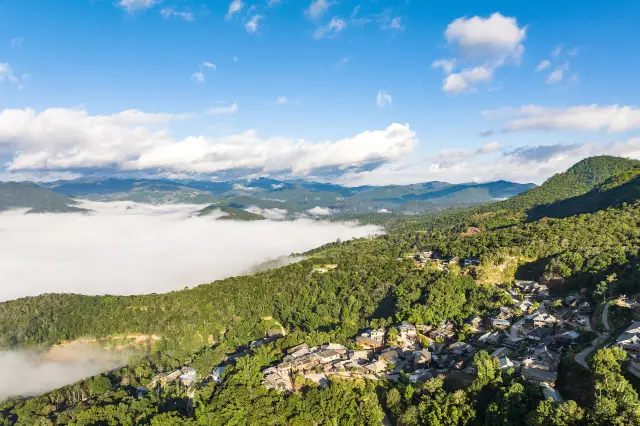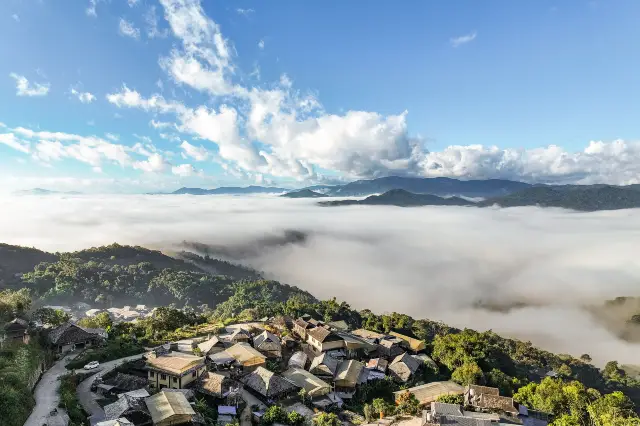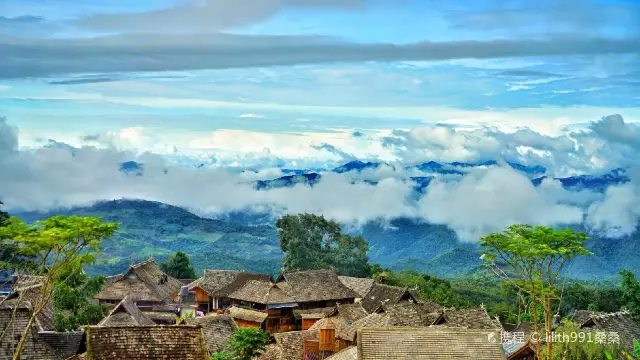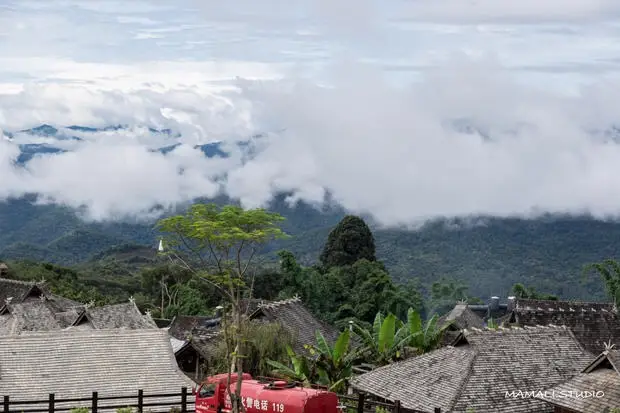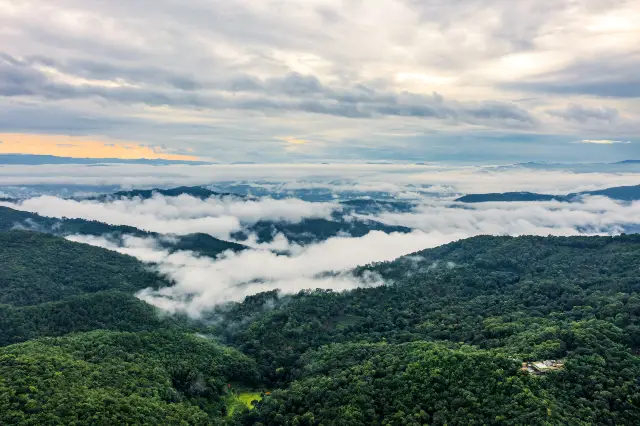Share to
Pu'er
Lancang
2025Sea of Clouds Sightseeing in Pu'er|trip.com
Sea of Clouds Sightseeing in Pu'er
4.5

No. 1 of Activities in Lancang
Best time to visitJan-Feb, Nov-Dec(Open all year)
Introduction Sea of Clouds Sightseeing in Pu'er
IntroductionSome information may have been translated by Google Translate
Pu 'er City is located in the southern Yunnan Province of China, located in the tropical plateau, the climate is changeable and the mountains are undulating, which provides unique conditions for the formation of the sea of clouds. The main peak of Pu 'er Mountain is the best location to enjoy the sea of clouds. Standing on the main peak, you can overlook the whole landscape of the sea of clouds of Pu 'er Mountain, with a wide vision and spectacular scenery. In addition, Jingmai Mountain is shrouded in clouds all the year round and is one of the six major tea mountains in China. In the early morning of autumn and winter season, climb the Jingmai Mountain landscape platform or pass, you can overlook the continuous sea of clouds, feel the unique charm of tea mountain and sea of clouds.
Trip Moments Sea of Clouds Sightseeing in Pu'er
Sea of Clouds Sightseeing in Pu'er Trip Moments
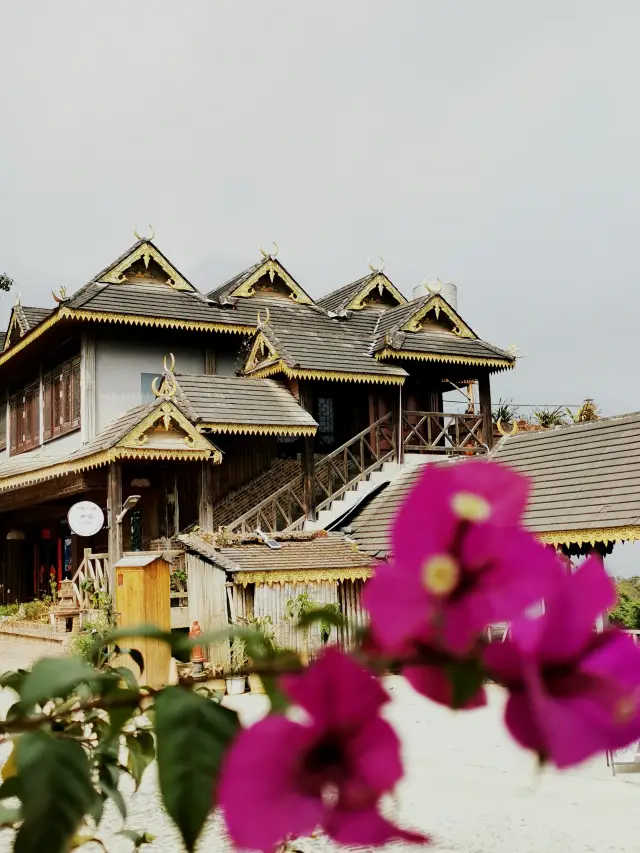
Jingmai Mountain | Mengben Dai Village
Jingmai Mountain | Mengben Dai Village ❥ Mengben is adjacent to Manggeng Village, and the village layout is similar. It is also a Dai settlement, with the village architecture descending from south to north. The temple in Mengben Village (Golden Pagoda Temple) is separate from the village center, and the village buildings are arranged around the village center. In fact, Mengben Village was established first, and Manggeng was later separated from Mengben. ❥ Mengben Village is composed of one social group, with attractions such as the Dai village, Golden Pagoda, Thousand-Handed Guanyin, Three Trees, and Jingmai Impressions. It is a tourist village in Jingmai Mountain, focusing on developing village Buddhist cultural tourism. In this original Dai village, every family grows tea, and every household makes tea. Tea is like the blood flowing in their veins here. ❥ On the road entering Mengben Village, there are three ancient banyan trees, which represent the story of three elders, the tea planting history of three ethnic groups, and the symbol of harmony and unity among the three ethnic groups. It is said that the Dai and Bulang ethnic groups had a conflict over an inconspicuous piece of land on the tea mountain, which even led to a fight. With the mediation of the Lahu ethnic group leader, they swore a blood oath to become sworn brothers and vowed to be united forever. To ensure that future generations remember this history, the three leaders planted three banyan trees as a testament to their eternal unity. This touching millennium-old story is still told today. ➠ Geographic location: Located in Jingmai Village, Huimin Township, Lancang Lahu Autonomous County, Pu'er, Yunnan.

Puer Panda Adventure: A Unique Experience
Must-try panda-themed activities in Puer! This 4-day tour will take you to explore Puer and get up close with giant pandas. Don't miss out! / 🛣️Itinerary: Day 1: Xiaoaizi Coffee Estate - Puer National Park Rhino Ridge Scenic Area - Sun River Forest Park The aroma of coffee and the primeval forest blend together. Explore the natural secrets of Puer and experience the unique forest atmosphere. Day 2: Nakeli Tea Horse Station Feel the charm of the Ancient Tea Horse Road in Nakeli and savor the traces of history and the fragrance of tea. Day 3: Wengji Blang Village - Nuogan Ancient Village - Laodabao Village Explore the ancient Blang villages, experience the simplicity of Nuogan and the musical charm of Laodabao, and witness the collision and fusion of cultures. Day 4: Return to Wengji Blang Village - Visit the Tea Ancestor Temple Return to Wengji, trace the origin of tea, pay homage to the Tea Ancestor Temple, and feel the thousand-year-old tea culture heritage. 🛬Return End your wonderful trip to Puer and return home with fond memories. / Travel Essentials: 🎒Traveling to Puer in January? Don't forget to bring these items! 👕 **Clothing**: Puer is warm during the day and cool at night in January. We recommend bringing a light down jacket, long-sleeved T-shirts, and jeans for easy layering. 👟 **Shoes**: Puer is mountainous, so a pair of comfortable sneakers is a must. If you plan to hike, prepare waterproof and breathable outdoor shoes. 🎩 **Sun and Rain Protection**: Hats, sunglasses, and sunscreen to protect against UV rays; a folding umbrella or raincoat for unexpected showers. 📱 **Electronics**: Mobile phone and charger are essential. Bring a camera to capture the beautiful scenery, and don't forget a power bank to ensure sufficient battery. 💳 **Documents and Money**: ID card, cash, and bank card. Safety is the top priority when traveling, so keep these items safe. / Puer is a land of tea fragrance and picturesque scenery. Don't miss this magical land. Start your Puer adventure now!

Ancient Tea Village Charm·Exploring Jingmai
Hidden in the world, Jingmai in Yunnan is known as the top niche attraction! It is the birthplace of Pu'er tea, the location for the fifth Aman hotel in China, and a melting pot of ethnic cultures in the southwest border. Located in Lancang Lahu Autonomous County, Pu'er City, Yunnan Province, it is far from the hustle and bustle, with only the interweaving fragrance of millennium-old tea and earth. Strolling here, one can deeply feel the unique cultural charm of the ancient minority villages. The ancient village is situated in Jingmai Mountain, Lancang County, Pu'er City, on the southwestern border of Yunnan. The itinerary can be flexibly adjusted, with options for a compact two-day tour or a leisurely experience over several days. In terms of transportation, the nearest airport is Lancang Jingmai Airport, but flights are limited; alternatively, one can choose Pu'er Simao Airport, about a four-hour drive; Xishuangbanna Gasa Airport is more convenient, three hours away by car. If time allows, it is recommended to visit Xishuangbanna first, then rent a car to Jingmai Mountain, delving into each village. The national highway along the way is in good condition, but be mindful of the road conditions after entering the mountainous area, especially the 20-kilometer gravel road section, where one should slow down to protect the tea mountain ecology. Recommended attractions include Wengji Ancient Village and Nuogang Ancient Village. Wengji Ancient Village is predominantly inhabited by the Blang people, along with other ethnic groups. Temples and residences are adjacent, with a strong commercial atmosphere. The enthusiastic residents will invite visitors to taste tea, and the unique shops make one feel the ancient village's breeze and slow-paced life. Nuogang Ancient Village is a Dai ethnic village with a light commercial atmosphere and simple and enthusiastic residents. Here one can taste local specialty teas, listen to residents tell cultural stories, and experience the original charm of the ancient village. The sea of clouds, sunrise, and sunset on Jingmai Mountain are all stunningly beautiful. If the weather is clear, it will surely amaze. When taking photos, it is recommended to choose early morning or evening when the light is soft, and the smoky villages are more evocative. For accommodation, one can choose to stay in the villages of Wengji or Jingmai Dazhai, or in Lancang County or Huimin Town, and drive up the mountain early in the morning. Tea Villa Hotel at the foot of Jingmai Mountain is recommended for its tranquil environment and attentive service. In the future, there will also be a cluster of high-end hotels like Aman around Huimin Town. Local cuisine is dominated by Dai and Blang flavors, with Dai dishes being sour and spicy, while Blang cuisine is more fragrant and spicy. Blang home cooking and Menghai barbecue on Jingmai Mountain are both cost-effective choices, with an average cost of about 50 yuan per person. After leaving Jingmai Mountain, one will surely reminisce about the experience, believing that they will set foot on this beautiful land many times in the future. This place will definitely make your trip worthwhile!

Jingmai Mountain | Jingmai Viewing Platform
❥ Inside the Jingmai Great Village, there is a viewing platform, which is a great place to watch the sea of clouds. There is a popular internet-famous coffee shop here, as well as a small square where a few villagers sell tea. They warmly invite you to drink tea, and it's okay not to buy. Unfortunately, the weather was not good at the time, and it was foggy, so I didn't see the sea of clouds. This place is suitable for drinking coffee, enjoying the scenery, chatting over tea, and taking photos for check-in. ➠Geographical location: Located in Jingmai Village, Huimin Township, Lancang Lahu Autonomous County, Pu'er, Yunnan.

Nuogan Ancient Village | A Primitive Village Hidden in the Mountains
Nuogan Ancient Village is located in Huimin Town, Lancang Lahu Autonomous County, Pu'er City. It is a natural village dominated by the Dai people and has a history of more than 1,000 years. The ancient village is surrounded by thousands of acres of ancient tea gardens, and the villagers have been living on tea planting for generations. The ancient village dwellings are characterized by a unique wooden structure and stilted architecture. The houses are stacked in layers, generally divided into two floors, with the first floor for storing sundries and the second floor for living. This is also to adapt to the hot and rainy climate of the tropical rainforest. 🚩Address: Nuogan Ancient Village, Lancang County, Pu'er City, Yunnan Province 🎫Tickets: Free 🕒Opening hours: All day 🚗Transportation: Self-driving is recommended (RVs are not allowed), the road is bumpy and difficult to walk 🏞Attraction features ✔️An ancient Dai village, retaining traditional stilted buildings, full of strong ethnic customs. ✔️The village is surrounded by mountains, shaded by green trees, and gurgling streams, like a paradise. ✔️Every household has local Pu'er tea, and the villagers are hospitable, and you can taste Pu'er tea for free. ✅Must-visit: 🌟Nuogan Ancient Village No. 100 Restaurant 🌟Wengji Banyan Tree Tea House If you also want to get away from the hustle and bustle of the city and find a quiet place, then Jingmai Mountain is definitely a good choice. ❤️ 🌄The residents here still maintain a hardworking and simple way of life. They are tea farmers, and every family has its own ancient tea land. Here, they work at sunrise and rest at sunset, as if time has stopped, like the last home of the human soul. ⚠️Notes 1. Respect local customs and pay attention to dress appropriately when entering temples and other places. 2. The ancient village is relatively primitive, and there may be more mosquitoes and insects, so remember to bring mosquito repellent. 3. The temperature difference between morning and evening is large, please bring one or two thick clothes. 5. Try to avoid driving at night. To protect the local ancient trees, the whole journey from Huimin Town to the ancient village is a gravel road. The journey is bumpy, so please drive carefully.
4

Hidden Peaceful Place | Yunnan Nuogan Ancient Village
| Yunnan Nuogan Ancient Village. If one day, your life is eroded by the hustle and bustle of the city. Would you be willing to seek the strength of the distant mountains? Experience the ecological culture of the ancient village. Take advantage of the fact that Nuogan, this unpopular ancient village, has not yet become popular, and feel its original charm. Travel Guide Nuogan Ancient Village Highlights: 1. The ancient village is currently free to visit, but with the successful application of Jingmai Mountain for World Heritage status, it may be turned into a paid scenic spot in the future, so be sure to visit as soon as possible. The current Nuogan and Wengji villages retain a good original ecology, without being overdeveloped, this simple feeling is precious. 2. The original and simple old village is located among the ancient tea gardens, and the village is surrounded by ancient tea gardens. Most families in the village make a living by planting tea. They have been planting tea for generations, simple and kind. 3. The architectural style of the houses is unique, mainly traditional earth-wood structures, with strong local characteristics. Among them, the traditional residences in the heart of the village are well preserved and are a good place for tourists to understand the local Dai culture. Climbing up to the viewing platform halfway up the mountain to overlook the entire village is very beautiful and photogenic. Perhaps only by flying a drone in Wengji can you see a good bird's eye view. In Nuogan, you can have a good view from the viewing platform or the temple in the village. Traffic conditions: The whole journey is very good, a short section of the highway was taken at the beginning, and the national highway is also OK after getting off the highway. After entering the gate of Jingmai Mountain, the road is paved with stones. Although it is a bit like a washboard, there are no pits on the road. After a long drive, your hands may feel a bit numb, but everything else is fine. Accommodation recommendation: Inside the ancient village, there are not many homestays and inns. Jingmai Dazhai and Wengji Ancient Village have more accommodation options. We chose to stay in Wengji, and the two villages are only a few kilometers apart by car. Food recommendation: In Nuogan Ancient Village, there are local restaurants opened by villagers, but we did not dine in the ancient village, so we cannot recommend specific restaurants. However, we drank local roasted milk tea in the ancient village, which is very mellow and rich. You must try it. You can also participate in roasting milk tea yourself, which is a great experience. Watching the sea of clouds: On the way up the mountain, you will see a viewing platform. We watched the sunrise over the sea of clouds here. The sunrise was at 8:00 that day, and we set off from the village at seven, and waited for half an hour when we arrived. Judging by the journey, it is almost half an hour ahead of departure from Nuogan. There are other places to watch the sea of clouds (Dajinta), according to the owner of the homestay, Dajinta can only see the sea of clouds, not the sunrise. We are not sure whether we can see it or not, because we did not go to Dajinta.

4-Day Pu'er Adventure | Must-See Detailed Guide
Calling all panda lovers! Save this 4-day Pu'er travel guide and follow in the footsteps of the pandas to discover a different kind of beauty and fun! / 🎉Recommended itinerary: Day 1: Nakeli Tea Horse Road Station ✨The curtain rises on a new journey at Nakeli Tea Horse Road Station, where we will savor its historical charm for a day. Day 2: Xiniuping Scenic Area, Pu'er National Park -> Laodabao Village Music Town, Lancang County -> Wengji Blang Village 🏞️Today is a full day. We will feel the charm of nature, experience the rhythm of music, and paint a vivid picture of Blang culture. Day 3: Jingmai Ancient Tea Garden -> Nuogan Ancient Village -> Jingmai Mountain Tea Forest Cultural Scenic Area 🍵Tea is the theme of the day. We will experience the vicissitudes of the ancient tea garden and the rich tea culture in the green mountains and rivers. Day 4: Jingmai Mountain 🚂Pack your bags, take one last look, and head home to end this wonderful trip to Pu'er. / Must-see attractions: 🐾Xiniuping Scenic Area, Pu'er National Park: A feast of animal resources and the unique charm of the monsoon evergreen broad-leaved forest will give you a different visual experience. 🍵Jingmai Mountain Tea Forest Cultural Scenic Area: Enjoy the elegance of tea in the ancient tea garden. This is a tea lover's paradise, where the fragrance of tea fills the air, mountains and rivers blend, and it feels like a fairyland. 🏞️Nuogan Ancient Village: The thousand-year-old Nuogan Village is located by the water and is picturesque. Entering it is like entering a paradise. 🏡Wengji Blang Village: A thousand-year-old Blang village, where you can learn about the customs of the Blang people and experience different scenery and folk customs. / 👕 Essentials: ☀️In Pu'er, the temperature difference is large, but it is still sunny, so don't forget to bring your sunglasses and sunscreen to protect your skin. Sweaters and coats should also be prepared to prevent the cold in the morning and evening. 🎒A travel bag, sneakers, and a hat are also essential, as Pu'er has many outdoor attractions that require hiking, so it's important to protect yourself. 📸The scenery here is beautiful, and both the natural scenery and ancient buildings are not to be missed. Therefore, be sure to carry a camera, spare batteries, and an SD card with you. A camera stand is even better. 🔖Finally, of course, documents. An ID card or passport is essential, and if you want to taste tea in a tea house in Pu'er, a credit card is also a must. / Pu'er is worth exploring and savoring. Let's feel its pride and mystery together! 😉If you like it, share it with your friends. 🥳
4

Jingmai Mountain | Wengji Ancient Village
❥ Wengji Ancient Village, an ancient village of the Blang people, is regarded as a microcosm of the Blang ethnic group. It is celebrated as the 'Millennium Blang Ancient Village' because it has preserved the Blang's original ecological culture and historical heritage. The village boasts beautiful natural scenery and prominent ethnic cultural features. ❥ The Blang people are one of the earliest ancestors in China and one of the oldest indigenous residents in Yunnan history. Their ancestors, the ancient Pu people, were among the first in the world to discover and utilize wild tea leaves and were also among the first in Yunnan to cultivate and plant tea. Today, they still rely on tea planting and production for their livelihood and are known as 'ancient tea farmers'. ❥ Entering the village, it seems that every household has tea leaves in front of their doors. Tea is their main source of economic income. Besides drinking, it is also used for cooking and even as a common herbal medicine by locals. The roofs of the houses in the village are decorated with patterns of one bud and two leaves, representing the totem of the Blang people. Walking down from the ancient temple, there are many tea shops on both sides of the road. No matter which tea shop you go to, the owner will warmly invite you in for tea. The sign 'Free Tea Tasting' can be seen everywhere in the village, and almost every household has a tea pavilion to entertain tea merchants and tourists from all over. ❥ The architectural style of Wengji Ancient Village is not much different from that of Nuogan Ancient Village, with the same dry-column structure, mostly two-story buildings with the ground floor elevated. The sloping roofs are covered with traditional hanging tiles. However, because Wengji has developed tourism earlier, most of the ground floors of the houses are used as shops. The roads in the village are paved with stone slabs, extending in all directions. Although there are chickens and ducks around, it is cleaner and less dusty. The Blang people prefer bright colors, and their clothing and decorations are colorful and pleasing to the eye. ❥ The Blang people believe in Theravada Buddhism, and the ancient temples are places where Theravada Buddhism is taught. The temples, with their stone-built bases, wide eaves, and broad ridges, the city towers with black tiles and red walls, and the red stone Qilin facing angrily to both sides, serve as both a sanctuary for the residents and a meeting room for the clan. They believe that all things have spirits, such as the spirit of the mountains, trees, rivers, etc. Therefore, the Blang people have a rich variety of sacrificial activities. ❥ Wengji Ancient Village is located at the northern end of Jingmai Mountain, at an altitude of about 1350 meters. Situated on high ground, the village offers views of the sea of clouds and other villages such as Mangjing Upper Village, Mangjing Lower Village, and Manghong. When we arrived, it was the beginning of the temperature drop on Jingmai Mountain, and it was near evening. It didn't feel cold in the car, but once we reached the village, we realized how cold it was and the wind was strong, which made us give up our plan to have dinner in Wengji Ancient Village. We took a quick tour around the village and left in a hurry. Currently, the accommodations and dining on Jingmai Mountain are mainly concentrated in Wengji, with relatively complete facilities and not highly commercialized. ➠Geographic location: Located in Jingmai Village, Huimin Township, Lancang Lahu Autonomous County, Pu'er, Yunnan.
4

Lancang during the Spring Festival | 2-day itinerary with endless laughter
| 2-day itinerary with endless laughter. Where do you want to go during the Spring Festival? Come to Lancang! We have prepared a 2-day itinerary for you to easily explore Lancang and experience the strong festive atmosphere and unique charm! -------- 🎈 Itinerary: Day 1: Jingmai Mountain Tea Forest Cultural Scenic Area - Ongki Bulang Old Village Explore the mysterious Jingmai Mountain Tea Forest, savor the profound tea culture, and then walk into the Ongki Bulang Old Village to experience the ancient ethnic customs. Day 2: Jingmai Mountain Ancient Tea Garden - Nuogan Old Village Wander through the ancient tea garden, learn about the long history of tea culture, and then head to Nuogan Old Village to experience the unique Dai customs and ancient architecture. -------- Must-visit attractions: - 🌳 Jingmai Mountain Tea Forest Cultural Scenic Area: Explore the 10,000-acre ancient tea garden and savor the aroma of tea and the beauty of the mountains and rivers. - 🏞️ Nuogan Old Village: The 1,000-year-old Nuogan Village is nestled among the mountains and rivers, offering breathtaking scenery. - 🏕️ Ongki Bulang Old Village: Immerse yourself in the ancient charm of the Bulang Village and experience the unique ethnic customs. -------- Travel essentials: 👕 Clothing: The temperature difference in Lancang is large in January. It is recommended to bring a light down jacket and sweater to cope with the temperature difference between morning and evening. 🎒 Personal belongings: ID card and driver's license are required. You can also bring student ID card and senior citizen's card to enjoy discounts. 📱 Electronic products: Don't forget your phone, charger, and power bank. If you like taking photos, remember to bring your camera. 🧴 Other supplies: Sunscreen, mosquito repellent, and comfortable sneakers are essential. -------- Don't forget to like and collect, next time you come to Lancang, you can easily explore without any worries!

A Super Detailed 2-Day Itinerary for Xishuangbanna: A Unique Experience Every Day!
Hey, everyone! Here's a 2-day itinerary for Xishuangbanna! Take this practical guide and start your tropical rainforest adventure! 🌴✨ . 🚩 Itinerary: Day 1: Jingzhen Octagonal Pavilion - Jengmaishan Tea Forest Cultural Scenic Area - Wengji Blang Old Village - Nuogan Ancient Village - Jengmai Millennium Ancient Tea Garden Explore the depths of history and visit the ancient charm of Jingzhen Octagonal Pavilion. Then, wander through Jengmaishan Tea Forest and experience the unique charm of nature and tea culture. Next, head to Wengji Blang Old Village and Nuogan Ancient Village to experience the ethnic customs, and finally immerse yourself in the grandeur of Jengmai Millennium Ancient Tea Garden. Day 2: Jengmai Millennium Ancient Tea Garden - Laodabao Village Music Town, Lancang County Continue to explore the mysteries of Jengmai Millennium Ancient Tea Garden and feel the vitality of each tea leaf. In the afternoon, head to Laodabao Village Music Town, Lancang County, and let the melodious music accompany you through a pleasant afternoon, experiencing a different kind of village music style. . Must-visit attractions: 🌟 Jengmaishan Tea Forest Cultural Scenic Area: A vast tea aroma awaits you! Taste tea in the ancient tea garden and feel the gift of nature. The tea aroma fills the mountains and rivers, making it a great place to relax. 🏞️ Nuogan Ancient Village: The beautiful scenery here is like a painting. The thousand-year-old village is located by the water, as if time has turned back, making people intoxicated by the ancient charm. 🏕️ Wengji Blang Old Village: Want to explore the ancient charm of a thousand years? Wengji Blang Old Village is the place to go! The Blang village here retains a deep cultural heritage, and every brick and tile tells the vicissitudes of history. . 🧳 Travel Checklist: Xishuangbanna November Travel Essentials 👕 Clothing: Short sleeves, light jacket, sun hat, and sunglasses are a must. 👟 Shoes: Breathable sneakers, so you won't slip while exploring the rainforest. 🎒 Backpack: Lightweight and waterproof, to hold your phone, wallet, and snacks. 🌞 Sunscreen: Sunscreen is a must, and bring an umbrella too. 📷 Photography Equipment: Camera, battery, and memory card, to capture the beautiful scenery. 🪪 Documents and Others: ID card, cash, bank card, and common medicines. . 🌴 Don't miss the magical journey to Xishuangbanna! Remember to follow me, and I'll take you to every corner of Yunnan! 🌴

2 Days in Lancang: A Must-Read Guide
2 days in Lancang: Enjoy the beautiful scenery and unique culture! Don't miss this super useful guide to make your trip even more exciting! / Must-visit attractions: 🌟 Jinuo Mountain Tea Forest Cultural Scenic Area: Explore the ancient tea garden that stretches for miles. This is not only a paradise for tea lovers, but also a place where the fragrance of tea and the beauty of nature blend perfectly. 🏞️ Nuogan Ancient Village: With a history of thousands of years, Nuogan is built by the water and is as beautiful as a painting, like a paradise beyond time and space. 🏯 Wengji Blang Old Village: Experience the ancient charm of the Blang mountain village. The stories and customs here will make you linger. 🎭 Laodabao Old Village: Here, you can not only admire traditional stilted buildings, but also experience the unique customs of the Lahu people. / 🎒 Travel essentials: Lancang travel checklist 🌴 👕 Clothing: The temperature difference between day and night in Lancang in January is large. It is recommended to bring a light down jacket, cotton and linen clothes, and a windbreaker to keep warm and breathable. 🎩 Accessories: Hats and sunglasses are essential for sun protection and style. Don't forget comfortable sneakers to make exploring attractions easier. 📇 Documents: Carry your ID card and driver's license with you. Bring your student ID, senior citizen card, etc. to enjoy special discounts. 💊 Other preparations: Common medicines such as motion sickness medicine and stomach medicine, as well as sunscreen and mosquito repellent, to make your trip healthier and more comfortable. / 🎉Don't wait, come to Lancang and start your adventure!🎉

A Guide to Lancang, Compiled After 3 Visits.
Tired of the hustle and bustle of the city and yearning for a touch of warmth and tranquility this winter? Look no further than Lancang, a hidden gem nestled in Yunnan Province! Here, warm sunshine, rich ethnic customs, and a plethora of scenic spots and delicious food await your exploration. Follow this guide and embark on a winter journey to Lancang. 🌟Introduction Lancang, officially known as Lancang Lahu Autonomous County, is located in the southwest of Yunnan Province. It is the only Lahu autonomous county in China. With its picturesque landscapes, diverse ethnic culture, pleasant winter climate, abundant sunshine, and temperatures consistently between 10-25°C (50-77°F)🌞, it's the perfect escape from the cold and a great place to bask in the winter sun. 🗺️Itinerary • Day 1: Arrive in Lancang County Town → Jingmai Mountain Wengji Ancient Village ◦ Morning: Arrive in Lancang County Town, take a break, and soak in the laid-back atmosphere. ◦ Afternoon: Head to Jingmai Mountain Wengji Ancient Village and wander through the ancient Dai and Lahu stilt houses, feeling as if you've traveled back in time. ◦ Evening: Check in to a guesthouse in Wengji Ancient Village, savor local delicacies, and experience the nightlife of the ethnic minorities. • Day 2: Jingmai Mountain Nuogan Ancient Village → Mangjing Village ◦ Morning: Wake up early to witness the breathtaking sunrise and sea of clouds over Jingmai Mountain, and immerse yourself in the grandeur of nature. ◦ Late Morning: Visit Nuogan Ancient Village and take photos by the clear ponds and ancient trees. ◦ Afternoon: Stroll through Mangjing Village, learn about Bulang tea culture, and taste authentic Pu'er tea. ◦ Evening: Return to the county town, explore the night market, and sample various snacks. • Day 3: Lancang Laodabao → Departure ◦ Morning: Visit Laodabao, the birthplace of "Happy Lahu," enjoy Lahu song and dance performances, and experience their enthusiasm. ◦ Afternoon: Free time for souvenir shopping, then depart, concluding your pleasant journey. 📸Photo Spots • Jingmai Mountain Wengji Ancient Village: The big banyan tree at the entrance of the ancient village is a perfect photo spot. With the ancient village as the backdrop, you're guaranteed great shots. The temple within the village, with its unique architectural style, is another great spot. Dress in ethnic clothing for an even more atmospheric photo. • Nuogan Ancient Village: The pond in the village, reflecting the ancient houses and the blue sky and white clouds, offers stunning photo opportunities. Stroll along the stone-paved roads and capture scenes of daily life for a touch of local flavor. • Laodabao: Have a friend take photos of you singing and dancing with the Lahu people in the square to capture those joyful moments. The traditional Lahu dwellings also make for great photo backdrops. 🍜Must-Try Food • Chicken Lafun: A traditional Lahu dish, the chicken and rice are stewed until tender, fragrant, and melt-in-your-mouth delicious. A must-try! • Grilled Dried Beef: Charcoal-grilled dried beef, crispy on the outside and tender on the inside, exudes a rich aroma. Paired with a special dipping sauce, it's simply divine. • Spicy Ant Eggs Salad: A Lancang specialty, the spicy ant eggs have a tangy and refreshing taste and are rich in nutrients. Don't miss this unique delicacy. • Lancang Rice Noodles: A delicious broth with smooth rice noodles and a variety of toppings. A bowl of this for breakfast will energize your day. 🏠Accommodation • Jingmai Mountain Wengji Ancient Village Guesthouses: We recommend "Wengji Ancient Village Inn." The wooden rooms are full of ethnic charm. Open the window to enjoy the beautiful scenery of the ancient village, and fall asleep to the sound of insects at night. • Lancang County Town Hotels: "Lancang Grand Hotel" is conveniently located, well-equipped, and reasonably priced, making it easy to travel and shop. 🎈Travel Tips • Lancang enjoys plenty of sunshine in winter, but the temperature difference between day and night is significant, so remember to bring a warm coat. • The UV rays are strong on Jingmai Mountain, so take sun protection measures. Hats, sunglasses, and sunscreen are essential. • Some local dishes can be quite spicy. If you can't handle spice, let the restaurant know in advance. • Respect the customs of ethnic minorities. Ask for permission before taking photos in the ancient villages. Winter in Lancang is a blend of warmth and beauty, a fusion of nature and culture. Every moment here is filled with joy and memories. Pack your bags and embark on your winter adventure in Lancang. You're sure to fall in love with this charming town💖!
4
